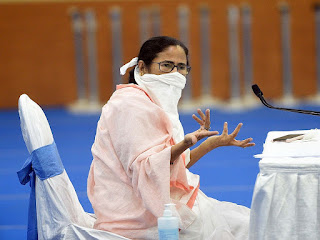Electioneering is back in business in West Bengal. The BJP's vote share had shot up to 41 percent in 2019 Lok Sabha elections and it had won as many as 18 seats. But the Trinamool Congress retained power in 2021 assembly elections and again consolidated party position in 2024 Lok Sabha polls.
Hence it goes without stating that the 2026 assembly election will be more fierce. One easy refrain is it is 'Do or Die' situation for both Mamata Banerjee-led Trinamool Congress and the BJP.
In last few years - the BJP leaders' campaign line has been - West Bengal had reposed faith in Mamata Banerjee in 2011 to bring in 'change (poriborton)' but she has betrayed the people.
But speaking technically she has not betrayed her core voters -- the Muslim population. Her 'Muslim appeasement' politics is well known and thus it is a principal election issue. With such a live issue at hand, the RSS cannot be far behind.
There is no denying that much of the groundwork over the years was done by the Rashtriya Swayamsevak Sangh (RSS). In fact, in the last decade the Sangh brought in their 'pracharak' from Andamans - Dilip Ghosh, who alongside shrewed netas such as Kailash Vijayvargiya, Arvind Menon and besides Amit Shah and J P Nadda, could organise the party cadres very well.
None can should forget the manner countless RSS workers toiled over the years.
A shift among the non-Muslim classes like tribals, Scheduled Castes and other vulnerable groups ensured party's unique success story in 2019 Lok Sabha polls.
That laid the foundation of a bigger struggle in 2021. The CAA law was also aimed to bringing in Matua voters closer to the BJP. The Matuas are a socially deprived community, called 'Namasudras' numbering around 30 million and they can influence outcome in 20-25 assembly segments.
In Bengal, the upper caste trio belonging to Kayastha, Brahmin and Baidya, together constitute less than a fifth of the population in the state.
Yet they have been dominating in every walk of life. That's how Bhadralok terminology has also come to stay.
Bhadralok actually means 'upper caste Hindus'.
Thus, the Matuas, Koch-Rabongshis, smaller Adivasi groups even Christians, Gorkhas in hills and rural poor in Bankura, Purilia, Birbhum and Jhargram became strong BJP supporters.
There was another reason. Muslims in rural Bengal also walked away with all OBC quota benefits.
It is also true that the ‘Partition’ created on communal lines had resulted in an "unprecedented suffering for the less privileged section of people".
Another take away from West Bengal during last 6-7 years is the exposure of sheer shambles in Bengal's administration and the running of its highly politically opportunists Babudom.
"Even the word 'babudom' making it akin to bureaucracy in India is also a gift from the state only as hundreds of 'Bengali clerks' working under British colonial masters posed themselves as doing something extra ordinary preferred to be addressed as 'Babus' and some as 'bara Babus'," says Kumar Jitendra Narayan, a member of the Raj gharana in Coochbehar in North Bengal.
Of course Alapan Bandyopadhyay, onetime West Bengal chief secretary, making news rather for wrong reasons and 'avoiding' a meeting even with Prime Minister of India on cyclone just to please his political boss in Kolkata's power centre shows things are rotten at the roots.
The Leftists ought to get their share of the credit or blame for this rot too.
According to a former Secretary and a retired officer in the state, the likes of Anish Majumdar, N Krishnamurthi, Rathin Sengupta and T C Dutt were made Chief Secretaries during the erstwhile Basu government because they were “either not given to taking tough stance or they were viewed as the pro-communists”.
 |
| Kumar Jitendra Narayan in front of Coochbehar palace Ends |






No comments:
Post a Comment